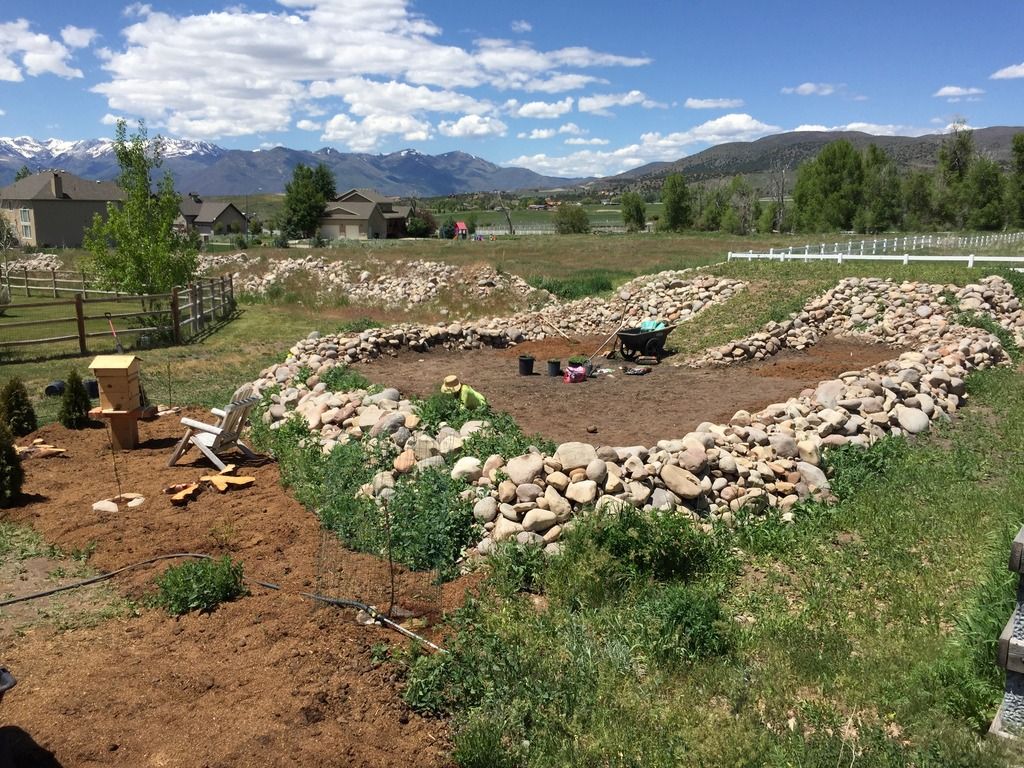|
glowing-fish posted:A big proportion of the world's wilderness is in places where the population and development aren't increasing. Northern Canada and Siberia are not places that are going to have a horde of suburban tract housing and McDonalds going up any time soon. (Even though mining in Canada is obviously an issue) Also from forestry, agriculture, habitat fragmentation, mining, suburban encroachment, climate change -induced habitat and ecosystem shifts, population movements in the next 100 years and other little things and so on but w/e
|
|
|
|

|
| # ? Apr 30, 2024 14:50 |
|
Wilderness is, at best, neutral under a capitalist system. The good of capitalism more or less demands that wilderness be destroyed, its preservation is more of a waiting game for more efficient later use. We romanticize it because of leftover feudal tendencies. The capitalist class seeks to emulate a feudal manor complete with a private wood for the hunt. This drive is fundamentally counterrevolutionary and needs to be expunged.
|
|
|
|
Have roads created genetically distinct populations of small animals and plants yet?
|
|
|
|
I say yes, until we can colonize other planets, then we can torch this stupid mudball.
|
|
|
|
VideoTapir posted:Have roads created genetically distinct populations of small animals and plants yet? I imagine they would be, as they are finding that effect in the various isolated parks of Brisbane and the lizards that live in them: http://www.brisbanetimes.com.au/que...427-gvtnev.html
|
|
|
|
VideoTapir posted:Have roads created genetically distinct populations of small animals and plants yet? More it creates inbreeding animals that can become genetically vulnerable: https://www.livescience.com/42500-cougar-inbreeding-habitat-fragmentation.html This is especially true the larger the animal gets, and needs more territory. A large population of deer can exist in a suburban forest area. That isn't true of apex predators, who need a couple square miles of territory between them.
|
|
|
|
El Perkele posted:Also from forestry, agriculture, habitat fragmentation, mining, suburban encroachment, climate change -induced habitat and ecosystem shifts, population movements in the next 100 years and other little things and so on but w/e If you look at the Yukon, the Northwest Territories and Nunavat, they don't really have much of a risk from agriculture or suburban encroachment, although mining is an issue in some of those places. I am guessing that if, in the next 100 years, the Yukon's population increases even to one million people (an increase of about 30 times the population size), that we will have other problems to worry about. Climate change is tremendous, but there are large chunks of the world that don't have to deal with population pressure.
|
|
|
|
The classic definition of wilderness will need to be discarded soon. Management of all land is increasingly important because natural processes cannot adequately cope with climate change and international spread of introduced species. There's really no going back at this point.
|
|
|
|
Burt Buckle posted:Who is the authority that confirms wolverine sightings because I need to talk to them immediately. Your wolverine infestation is a side effect of Gov Walker enacting Right To Work laws. Now every time someone is heard humming "Hail to the Victors" in the office, they get fired. Those wolverines are out of work and scrounging for food. And if they hum "Devil with a Blue Dress" they get shanked in the parking lot.
|
|
|
|
Humans are poo poo, don't spoil the world for more of them, I say
|
|
|
|
Phyzzle posted:Biodiversity seems more desirable than having lots of acreage two miles from a road (when that acreage is mainly parched scrubland). A robust ecosystem needs a lot of contiguous territory, though. These ecoducts are a pretty nifty idea. I really wish we had those here. Even with high fences on both sides of the highways and "escape ramps" incorporated into them, there are way too many moose, elk and muledeer smashed on a regular basis. call to action posted:Humans are poo poo This I lived North of Leesburg VA a few years in the early 90s. Was beautiful rolling countryside. Now it is sprawl as far as the eye can see. I live now in a very small town in the mountains, much like NOVA was decades ago. Sadly it is one of the fastest growing communities in Utah and for some reason the councils use that as a reason to allow more development, while completely missing WHY people want to move here. Families who claimed thousands of acres hundreds of years ago (and left it mostly wild) now are decendants who happily sell off to developers and the councils just let them chop it up at will unless the community swarms in to object. Sadly by then the damage is done. Humans are indeed poo poo. Fog Tripper fucked around with this message at 19:54 on Jun 13, 2017 |
|
|
|
Fog Tripper posted:Families who claimed thousands of acres hundreds of years ago (and left it mostly wild) now are decendants who happily sell off to developers and the councils just let them chop it up at will unless the community swarms in to object. Sadly by then the damage is done. Yeah...I am blessed to still have a considerable acreage in my family. I found myself after the economy "bounced back" around 2011 or 2012 wishing it would crash again...some of the neighbors decided to flip on 30-40 acres here and there...now we have about four or five new homesteads in the area and its enough to break up the "wilderness" I used to know as a kid. Not to mention these loving people let dogs run lose on others property, tearing poo poo up with four wheelers, basically just shithead city slickers to me.
|
|
|
|
Peetown Manning posted:Yeah...I am blessed to still have a considerable acreage in my family. I found myself after the economy "bounced back" around 2011 or 2012 wishing it would crash again...some of the neighbors decided to flip on 30-40 acres here and there...now we have about four or five new homesteads in the area and its enough to break up the "wilderness" I used to know as a kid. Not to mention these loving people let dogs run lose on others property, tearing poo poo up with four wheelers, basically just shithead city slickers to me. I should read up about back when claims were staked and the land was agriculture-based. It should not be allowed to be chopped up and sold off like that, IMHO. I am with you about the city slickers thing. A healthy % of the properties up here are second homes and rentals. Both they and their renters have virtually zero respect for what makes the area worthwhile. Thankfully second homes and rentals get taxed at a much higher rate. But still the developers (who also do not live here) are happy enough to act as carrion birds. I take that back, carrion birds are necessary to clean things up. Developers just pillage. Fog Tripper fucked around with this message at 20:12 on Jun 13, 2017 |
|
|
|
Fog Tripper posted:I lived North of Leesburg VA a few years in the early 90s. Was beautiful rolling countryside. Now it is sprawl as far as the eye can see. I live now in a very small town in the mountains, much like NOVA was decades ago. Sadly it is one of the fastest growing communities in Utah and for some reason the councils use that as a reason to allow more development, while completely missing WHY people want to move here. Families who claimed thousands of acres hundreds of years ago (and left it mostly wild) now are decendants who happily sell off to developers and the councils just let them chop it up at will unless the community swarms in to object. Sadly by then the damage is done. Agreed, this is why when I was able to buy a place, I chose one that was surrounded by land that is either economically unbuildable due to slope or owned publicly. Hopefully the park stays a park...
|
|
|
|
call to action posted:Agreed, this is why when I was able to buy a place, I chose one that was surrounded by land that is either economically unbuildable due to slope or owned publicly. Hopefully the park stays a park... The council thing really bugs me when they ejaculate about how great that we are such a popular and fast growing community. How exactly is that a benefit to the current residents and the land surrounding us?  Crossposted pic of a 180 from my backyard. The mountains in the distance pretty much surround our relatively flat county. Most all of them are national or state forest save a good chunk that has a developer building at increasingly higher elevations. Not because there are not beautiful views from pretty much the entire valley, but because they want their home to be seen. 
Fog Tripper fucked around with this message at 20:58 on Jun 13, 2017 |
|
|
|
That place looks like a shithole. gently caress the wilderness.
|
|
|
|
Fog Tripper posted:I should read up about back when claims were staked and the land was agriculture-based. It should not be allowed to be chopped up and sold off like that, IMHO. As for agriculture...the convenient name for it has escaped me but there are considerable lands around me being paid by the federal government to not be farmed. This could go in the urban poverty thread but that's a huge political point for the old timers around there. They just see a big waste in people paid to let the weeds take over.
|
|
|
|
Peetown Manning posted:As for agriculture...the convenient name for it has escaped me but there are considerable lands around me being paid by the federal government to not be farmed. Are you thinking of leaving fields fallow? Is it for crop rotation or some other purpose?
|
|
|
|
Lightning Lord posted:Are you thinking of leaving fields fallow? Is it for crop rotation or some other purpose? Nah they've been that way for decades. Think it has to do with surpluses and the Great Depression.
|
|
|
|
Fog Tripper posted:
I am not trying to be pedantic about this, but it is kind of the point of the post. Nothing North of Leesburg, Virginia has been wilderness for 200 years, maybe 300 years. Given the density of Native American settlement there, and its closeness to a major waterway, possibly for a thousand years.
|
|
|
|
glowing-fish posted:I am not trying to be pedantic about this, but it is kind of the point of the post. Lol glowing-fish I don't believe you are capable of ever resisting an opportunity to be pedantic.  In your opening post you started by defining wilderness as "“an area where the earth and its community of life are untrammeled by man, where man himself is a visitor who does not remain.” You also expanded on this definition with various other arbitrary or relative criteria, like no "visible" human technology (ecologically, only relevant to a few Prairie species so-far-as I know), at least two miles from a road (why two and not three miles I wonder? Couldn't we use metric measures instead of imperial?), and a "more or less" complete ecosystem. Strictly speaking speaking following your opening definition wilderness hardly exists anywhere on earth, certainly not the Canadian north and probably only in Antarctica and maybe some tropical peat forests. Humans have altered almost all landscapes and animal communities on earth dramatically, it has all been trammeled. So of course we are instead speaking broadly, the more-or-less untrammeled wilderness, approximately intact, with relatively few signs of human presence. Into this space we can introduce many common and productive manifestations of wilderness. Trendy today is Urban Wilderness, perhaps exemplified in its modern form by the New York High Line Park. There has been a number of studies of the diverse plant communities in the abandoned lot, and the wild diversity of the bilgewater hitchhikers that proliferate in the coastal waters of the modern freight harbor. These communties are not natural in the traditional sense, but in some ways they are more wild than the tightly regulated macrofauna of a place like Yellowstone, where every wolf and bison is carefully tallied and the surplus culled, and every aspect of the system is carefully monitored and managed. When we talk about a concept like wilderness it is not analogous to something like chemistry where we can empirically test for the presence or absence of an element in a repeatable experiment. There's no acid test for wilderness. Rather wilderness is a mental model which we can apply to make sense of real circumstances. In the parlance of Sociology we can call wilderness an Imaginary. From wikipedia an imaginary is defined as those "institutions, laws, and symbols common to a particular social group and the corresponding society through which people imagine their social whole." The definition you have used has a very clear historical origin rooted in Romantic philosophical notions of the Sublime and particularly influenced by the work of American Preservationists like John Muir. Pointing out that Wilderness is a social construct is important when addressing the differences in the ways other people make sense of the concept of wilderness. I recently attended a lecture on the differences in Environmental Imaginaries between the American West, which you exemplify, and in the Southeast, which is comparatively disinterested in preservation and much more centered around the use-value of the landscape. Imaginaries shape our values and priorities, and successful conservation often involves navigating the idiosyncratic needs and values of local communities. Wilderness is a mental model with a form that varies depending on circumstance and necessity. it's just as foolish and pointless to claim exclusive supremacy for your own peculiarly Western-American Imaginary, as it is to claim rural areas have to be x-distance from a city, or mountains have to be higher than x meters. Drawing these kinds of distinctions depend on are own subjectivities. As far as answering the question in the OP, I think we should all try and keep a little wilderness in our backyard if we can manage. Plant some wildflowers and let them grow themselves, enjoy the butterflies and other pollinators. I also try and remember though that the Imaginary wilderness is a tool through which I can make sense of the world and ascribe value to my actions, and that there are other imaginaries no less useful for accomplishing many of the same ends. It is a useful tool, but ultimately not prerequisite, and many people today go without just fine.
|
|
|
|
Squalid posted:Lol glowing-fish I don't believe you are capable of ever resisting an opportunity to be pedantic. I think it is necessary to differentiate between wilderness and nature, mostly because people who have never been in a wilderness area seem to literally not be aware that it exists. I know that there is not a perfectly objective definition of what a "wilderness" is. I know that all "wilderness" areas are impacted by human activities, and that even very urban places have some wild species living in them. I also know that areas that have gravel roads but not settlement are probably not that much different than areas that are designated wilderness. But yes, there is an objective difference between an area that has climax forests, a complete ecosystem with little or no invasive species, megafauna, and no obvious human structures, and an otherwise natural area that has these things. The problem is, if you have never been in a wilderness area, you drive 2 hours to uncle Bob's house, you see he has 20 acres of trees and that there are deer on his property, and that is wilderness, and you don't realize that there actually is something called wilderness. To call this a pedantic distinction is like if someone wants to take LSD for the first time, and you tell them to be careful, and they say "oh, its okay, I've smoked marijuana a lot, and its the same thing". It might seem like an odd analogy, but its actually pretty fitting: the difference between a natural area, like the Adirondacks, and a wilderness area, like the Selway-Bitterroot, is basically the difference between smoking a few hits and watching some Star Trek episodes, and taking 200 mcg of LSD and spending 12 hours realizing that nothing is real or will ever be real. glowing-fish fucked around with this message at 06:20 on Jun 14, 2017 |
|
|
|
We can draw our arbitrary lines wherever we want, the trick is making them useful. That's the important take away. By equating the emergent wild ecosystems of the modern urbanity with low-human disturbance systems we can illustrate the interconnectedness and complexity of natural systems in a way that's tangible, and inculcate conservationist or preservationist values. Unfortunately most people, including most pre-modern people, live very far away from any wilderness and will probably never interact with it. In fact if they did so it would probably stop being wilderness. And I don't think things are really as clear cut as you imply. Yes there's a big difference between ecological systems in highly disturbed urban areas and the most remote least populous regions, but what about the places with a few patches of climax forest, a few invasives, some of the pre-modern megafauna, and a few distant human structures (or maybe just a few tin cans left by cowboys)? If you are too exclusionary in your model definitions you'll only lead to the this circumstance described by Fitzy Fitz all the sooner: Fitzy Fitz posted:The classic definition of wilderness will need to be discarded soon. Management of all land is increasingly important because natural processes cannot adequately cope with climate change and international spread of introduced species. There's really no going back at this point. I think exhibits a more European approach to wilderness than we usually see in America, where much tighter control of the landscape and natural processes is the norm.
|
|
|
|
What do you all think of the prospect of "forest cities", structures that are flora and fauna friendly so nature is integrated into our developments? Plants growing all over buildings, etc
|
|
|
|
glowing-fish posted:I am not trying to be pedantic about this, but it is kind of the point of the post. Good point. However I tend to include natural open spaces as wilderness as well. But for the focus of the thread I will exclude it. That said, you may as well exclude the mountains here out west that have been logged for generation and the valleys that have been used for grazing livestock. Even in the high Uintas I was shocked while elk hunting a considerable distance from humans (so I thought), to suddenly find myself in the middle of a herd of cattle being driven by cattlemen. I moved here from back east and it's light polution. Even though I had spent a ton of time in what I thought were wild areas when hunting, none of it would have applied to this thread. When we bought our current home I was actually freaked out at night because to the west there was light polution from SLC on the other side of the mountains, but to my east was just pitch black that sucked at my eyes much like the Grand Canyon does. However even that direction that used to intimidate me would not be applicable to this thread, even with the wolves, coyote, moose, elk, mountain lions, etc. It is national forest but logged and camped and used as livestock range. Fog Tripper fucked around with this message at 12:53 on Jun 14, 2017 |
|
|
|
Squalid posted:We can draw our arbitrary lines wherever we want, the trick is making them useful. That's the important take away. So, for example, with roads, here is why roads make a difference. Maybe it doesn't matter whether the road is 2 miles away or 3 miles away, but the presence of roads do make a difference. Construction of a road, even a gravel road, means that there is going to be heavy equipment moving in to construct and maintain the road. It also provides a very good channel for invasive species to enter a wild area. Weeds will follow the disturbed ground of a road. And, in general, even if the species aren't invasive, a road is a cut in the landscape. The construction and existence of roads leads to soil erosion and compaction. This can disturb water flow, pollute and sediment streams, etc. The existence of roads leads to noise pollution and human presence, which can scare away some shyer species. I mean, all of these things are on a scale, and invasive species exist without roads, there is sedimentation and stream degradation from natural erosion, but in general, just laying a gravel road that might see 10 cars a day across a national forest does change it, in ways that can be objectively measured. I mean, the title of this thread is "Does the World need Wilderness?". "No" is a good answer to that, but the idea that there is no important distinction between wilderness areas and anything green avoids the question. Its like I posted a thread asking who likes heavy metal music and you were posting "YEAH! JON BON JOVI ROCKS!" and then arguing that hey, there are guitars and drums, that is like a heavy metal. I mean, it is something, but its not what we are talking about.
|
|
|
|
glowing-fish posted:I think it is necessary to differentiate between wilderness and nature, mostly because people who have never been in a wilderness area seem to literally not be aware that it exists. I myself have never been in a wilderness area and I am skeptical of its existence. If wilderness exists how come I haven't seen it?
|
|
|
|
Fitzy Fitz posted:The classic definition of wilderness will need to be discarded soon. Management of all land is increasingly important because natural processes cannot adequately cope with climate change and international spread of introduced species. There's really no going back at this point. There are some situations where managing a landscape for purposes of mitigating climate change would be different for managing it for the benefit of biodiversity and wildlife: a densely packed forest is going to handle more carbon, but is probably going to be unfavorable for landscape and wildlife. (An open canopy allows greater biodiversity in understory flora, some animals like bighorn sheep prefer open woodlands over forests) But the other question is: how exactly do you suggest that the landscape to be "managed"? The Selway-Bitterroot wilderness, for example, is 2000 square miles, with no roads. Even fighting fires there is often skipped just because there is no way to get people in. What type of headcount would you need to "manage" it?
|
|
|
|
Burt Buckle posted:I myself have never been in a wilderness area and I am skeptical of its existence. If wilderness exists how come I haven't seen it? Can you imagine a band that was HARDER than JON BON JOVI? That is obviously impossible.
|
|
|
|
glowing-fish posted:There are some situations where managing a landscape for purposes of mitigating climate change would be different for managing it for the benefit of biodiversity and wildlife: a densely packed forest is going to handle more carbon, but is probably going to be unfavorable for landscape and wildlife. (An open canopy allows greater biodiversity in understory flora, some animals like bighorn sheep prefer open woodlands over forests) I'm using the term "management" loosely. What I mean is that the Wilderness Act's definition of wilderness is quaint; a hands-off/minimalist approach often does nothing but preserve raw acreage and perceived wildness. Mechanized tools are going to do less damage to a wilderness area than failing to adequately address the spread of invasive species. A visitor may perceive the chainsaw as degrading the "naturalness" of the place, but that's just because he's unaware that he's totally surrounded by a monospecific stand of privet. Obviously the approach will be very different in a desert area or a marine one. It needs to be very area-specific. I guess in reference to your example, we should dedicate enough public resources so that allowing wildfires to burn can stem from a deliberate decision rather than a lack of resources. In other areas, we should be the ones starting the burns. Again, very area-specific. I'm just thinking out loud. This is a very broad topic.
|
|
|
|
VideoTapir posted:Have roads created genetically distinct populations of small animals and plants yet? Yes, and right now I'm sitting in a nature reserve where a study found genetic differences between flightless beetles to the left and right of the road cutting through the area.
|
|
|
|
blowfish posted:Yes, and right now I'm sitting in a nature reserve where a study found genetic differences between flightless beetles to the left and right of the road cutting through the area. Friend of mine studies this in super urban areas, nyc etc. https://ed.ted.com/lessons/evolution-in-a-big-city#review His website http://nycevolution.org/ Im a PI on the coyote study he mentions http://www.gothamcoyote.com/ I also work at a nature preserve about 50 mi outside of nyc that in part consists of old growth eastern hemlock forest. So i work on both sides of the pristine vs novel ecosystem debate. There is no 1 answer. If mugwort colonizes a vacant lot in a city's downtown that seems like a good thing - little else could live there, at least at first. At the same time a huge part of our time and money at the preserve is spent keeping invasives out of the forest core. If we didnt the whole system would quickly be fundamentally altered (quickly being relative to trees of course - 50 to 100 years). The other big "problem" here is the super abundance of white tailed deer. In order to protect the forest we try to kill as many deer as we can. Kind of confusing to the average outdoor enthusiast but that is the current situation in the suburban landscape. I am of the opinion that closing the preserve to hiking would be a huge benefit, esp regarding invasives. However the donations coordinator might disagree - people need to care about something if you want them to support it, and most people need to experience something directly in order to care. The high line post-renovation, btw is a terrible example of urban wilderness. Every inch of that is manicured and it is basically a patio. But in the places humans have modified to a point where situations and habitats exist that have never existed before, novel communities are arising and this is fascinating scientifically as well as hopeful. Wolverine guy, if you're still around - if you have good pics you might consider getting your record published. Or buy a cheap camera trap and get some pics. Here is a good place. https://biotaxa.org/CL Info on cams https://www.trailcampro.com/ Happy to help with IDing or recommending a camera
|
|
|
|
One of these days I will pull the trigger on a couple trail cams.
|
|
|
|
Fitzy Fitz posted:The classic definition of wilderness will need to be discarded soon. Management of all land is increasingly important because natural processes cannot adequately cope with climate change To illustrate this point and others from this thread, should the Isle Royale National Park/Wilderness Area save their wolves ? Last winter the National Park Service announced they'd prefer to reintroduce them. There's been years of debate between people who believe the point of the park should be minimal-human impact wilderness vs the people who want to preserve the current ecosystem. The preservation opinion opens up several other questions too. Which ecosystem should the park preserve? Before the arrival of man the island had lynx and caribou and it was the previous actions of men that lead to their extirpation and arguably the introduction of moose and wolves in the 20th century. It's also not clear that wolves can survive long term without human assistance because of the reduction in ice bridges to the island.
|
|
|
|
There really isn't a clear answer to that. All preservation is IMO arguably selfish and human-centered, even if it involves minimizing human impact. We're preserving because we want to, not because it's some sort of objective good. So pre-human ecosystems aren't inherently any better than disturbed ones, even though we frequently value them more for their rarity, uniqueness, etc. I'm not familiar with Isle Royale, but you'd want to weigh the inputs of the affected interest groups, the feasibility of the different preservation plans, the (non)existence of similar protected areas, etc. You probably can't revert a place like Isle Royale that drastically to its pre-human state, but you're more likely able to revert it to a sort of pre-Columbian state. Whether that's a good idea would come down to the input from interest groups and uniqueness or the site vs its value for recreation, education, or whatever.
|
|
|
|
Fitzy Fitz posted:There really isn't a clear answer to that. All preservation is IMO arguably selfish and human-centered, even if it involves minimizing human impact. We're preserving because we want to, not because it's some sort of objective good. In the case of the wolves it may be an attempt to fix what circle of life ecosystem we've disrupted. The "wilderness" was already changed by human interaction. If something is dying out not due to human impact, Darwinism should run it's course, IMHO. We could discuss how we preserve every human we can, without a thought to objective good. Not a comfortable discussion though. Fog Tripper fucked around with this message at 23:19 on Aug 3, 2017 |
|
|
|
I would prefer to save every species, even if humans aren't responsible for their decline  That's what I mean about it being subjective though. That's what I mean about it being subjective though. Except mosquitoes. They can gently caress off.
|
|
|
|
Fog Tripper posted:In the case of the wolves it may be an attempt to fix what circle of life ecosystem we've disrupted. The "wilderness" was already changed by human interaction. It's complicated. For example one of the big threats to biodiversity in Ireland is actually reforestation. There's several species of rare bog adapted plants that only occur in sheep pastures. With the decline of the wool industry many of those pastures have been abandoned, and the land is reverting back to a natural or semi-natural forested state for the first time in 2000 years. In this case a return to wilderness will actually mean a loss of biodiversity. In cases like this there's no "right "response. But you have to consider the changes we've already made and preserving artificial habitats may sometimes be the best response.
|
|
|
|
CyclicalAberration posted:To illustrate this point and others from this thread, should the Isle Royale National Park/Wilderness Area save their wolves ? Last winter the National Park Service announced they'd prefer to reintroduce them. There's been years of debate between people who believe the point of the park should be minimal-human impact wilderness vs the people who want to preserve the current ecosystem. The preservation opinion opens up several other questions too. Which ecosystem should the park preserve? Before the arrival of man the island had lynx and caribou and it was the previous actions of men that lead to their extirpation and arguably the introduction of moose and wolves in the 20th century. It's also not clear that wolves can survive long term without human assistance because of the reduction in ice bridges to the island. Just from a biological point of view, it doesn't seem to be a good idea. From my wide research on the matter (reading a wikipedia article), it seems that wolves are not native to the island and it is too small to contain a stable population of an apex predator. Someone who knows more about this might be able to comment better, but it seems that apex predators have a non-linear relationship to population size. You might be able to sustain a pack of 40 wolves on an island twice the size of Isle Royale, but the genetic bottleneck gets too small on Isle Royale. One of the main reasons for preserving wilderness is that solid chunks of undisturbed habitat seem to be necessary as a core for some animals to breed and maintain their populations. Even when they can go and live in semi-wilderness areas, they need wilderness to replenish their populations.
|
|
|
|

|
| # ? Apr 30, 2024 14:50 |
|
Fitzy Fitz posted:There really isn't a clear answer to that. All preservation is IMO arguably selfish and human-centered, even if it involves minimizing human impact. We're preserving because we want to, not because it's some sort of objective good. So pre-human ecosystems aren't inherently any better than disturbed ones, even though we frequently value them more for their rarity, uniqueness, etc. This is total nonsense, there is a huge amount of value to well-established ecosystems. And please don't bother me with the "wellll really there's no such thing as good or bad when you think about it, maaan" moral relativism idiocy. You can tell bullshit opinions like yours because they ~just happen~ to line up exactly with capitalists, imperialists, and assholes.
|
|
|






















 I CANNOT EJACULATE WITHOUT SEEING NATIVE AMERICANS BRUTALISED!
I CANNOT EJACULATE WITHOUT SEEING NATIVE AMERICANS BRUTALISED!